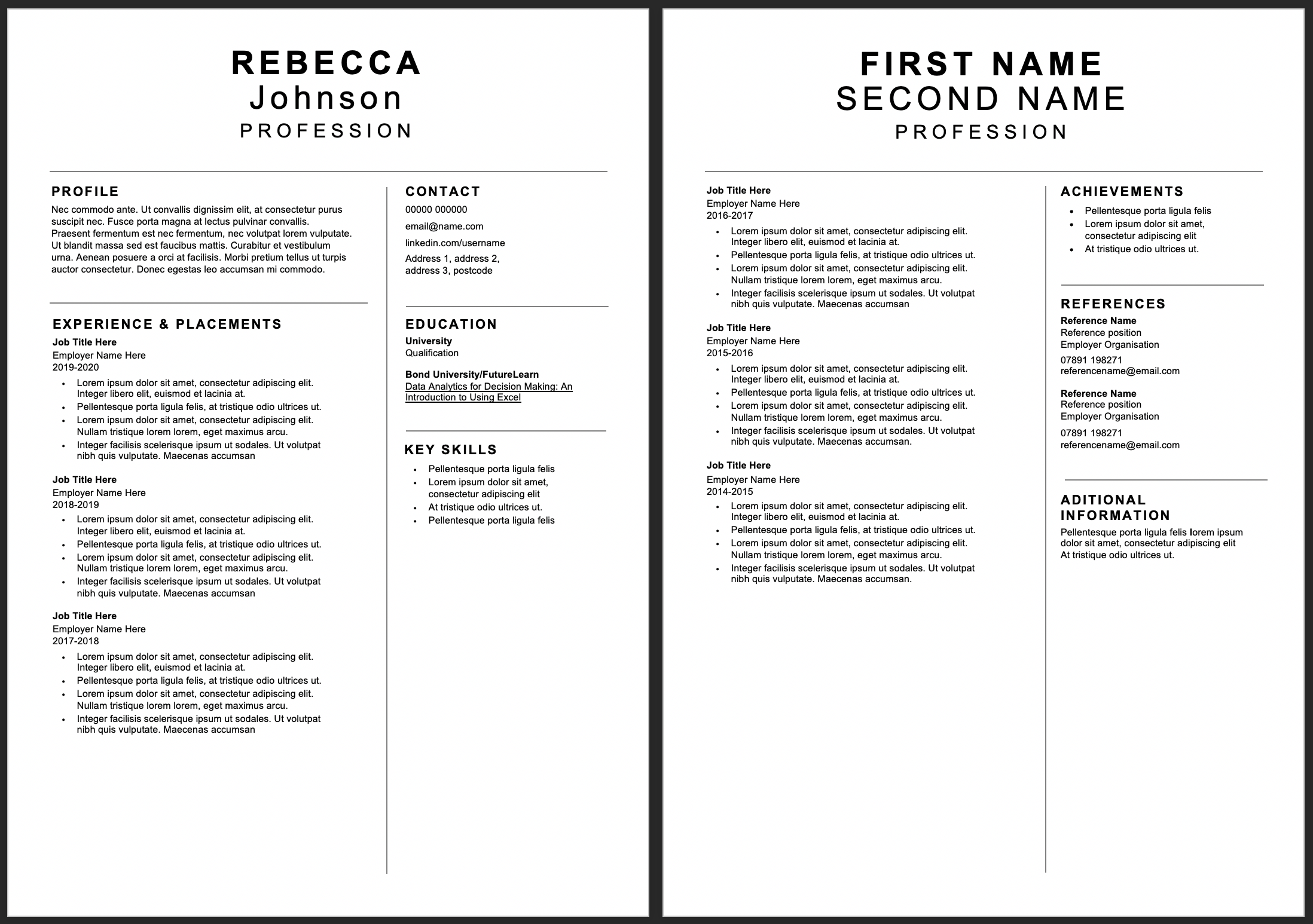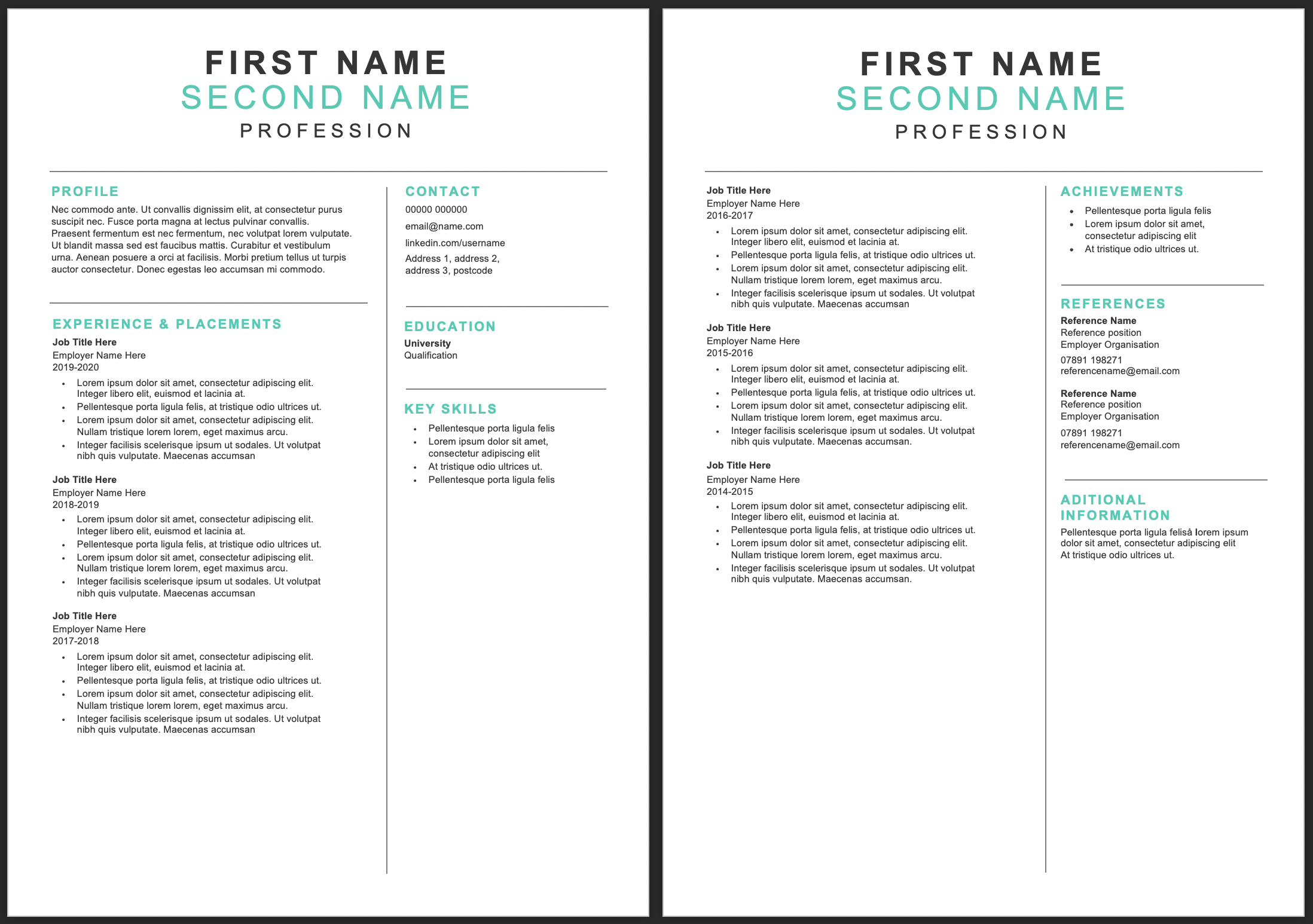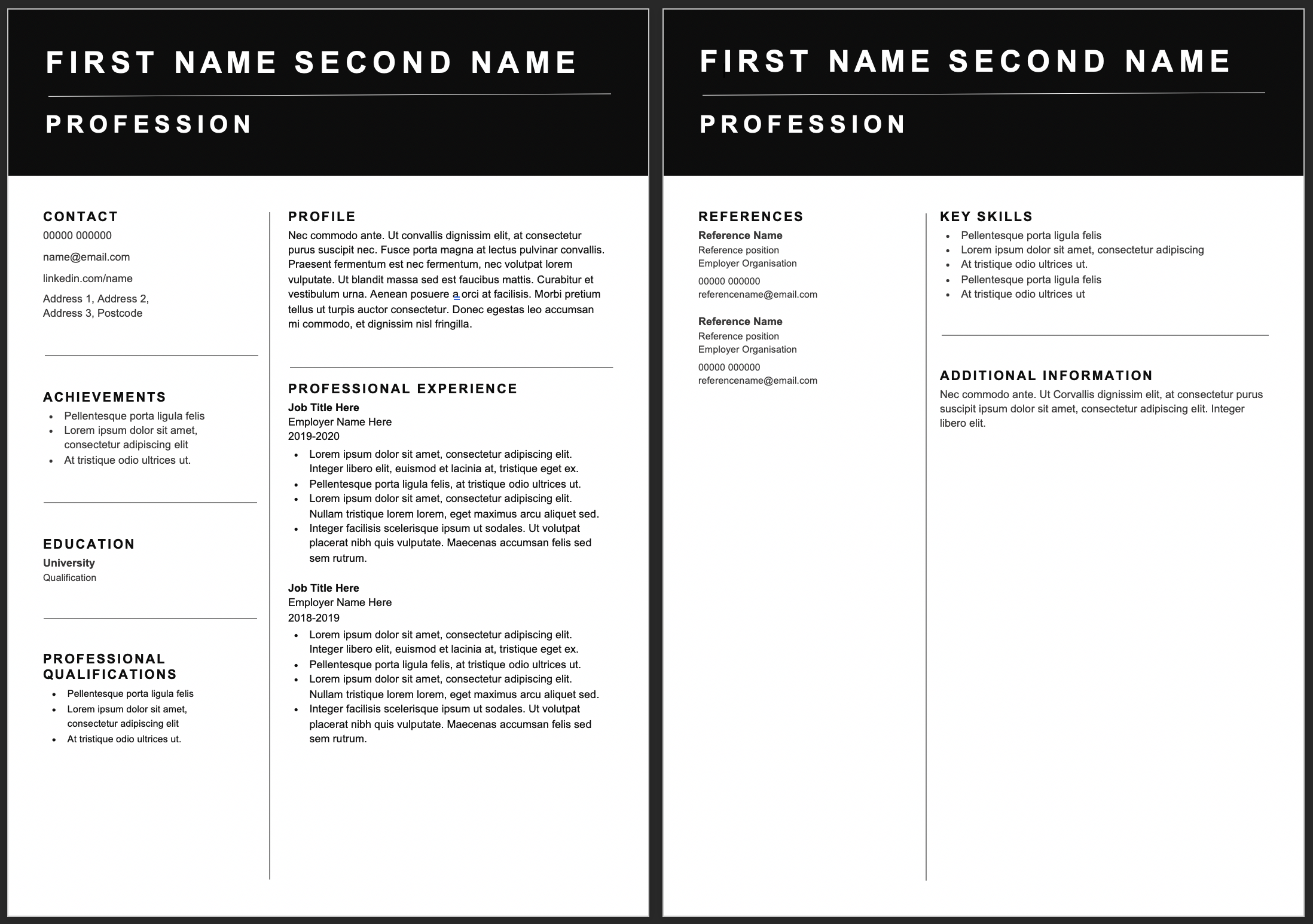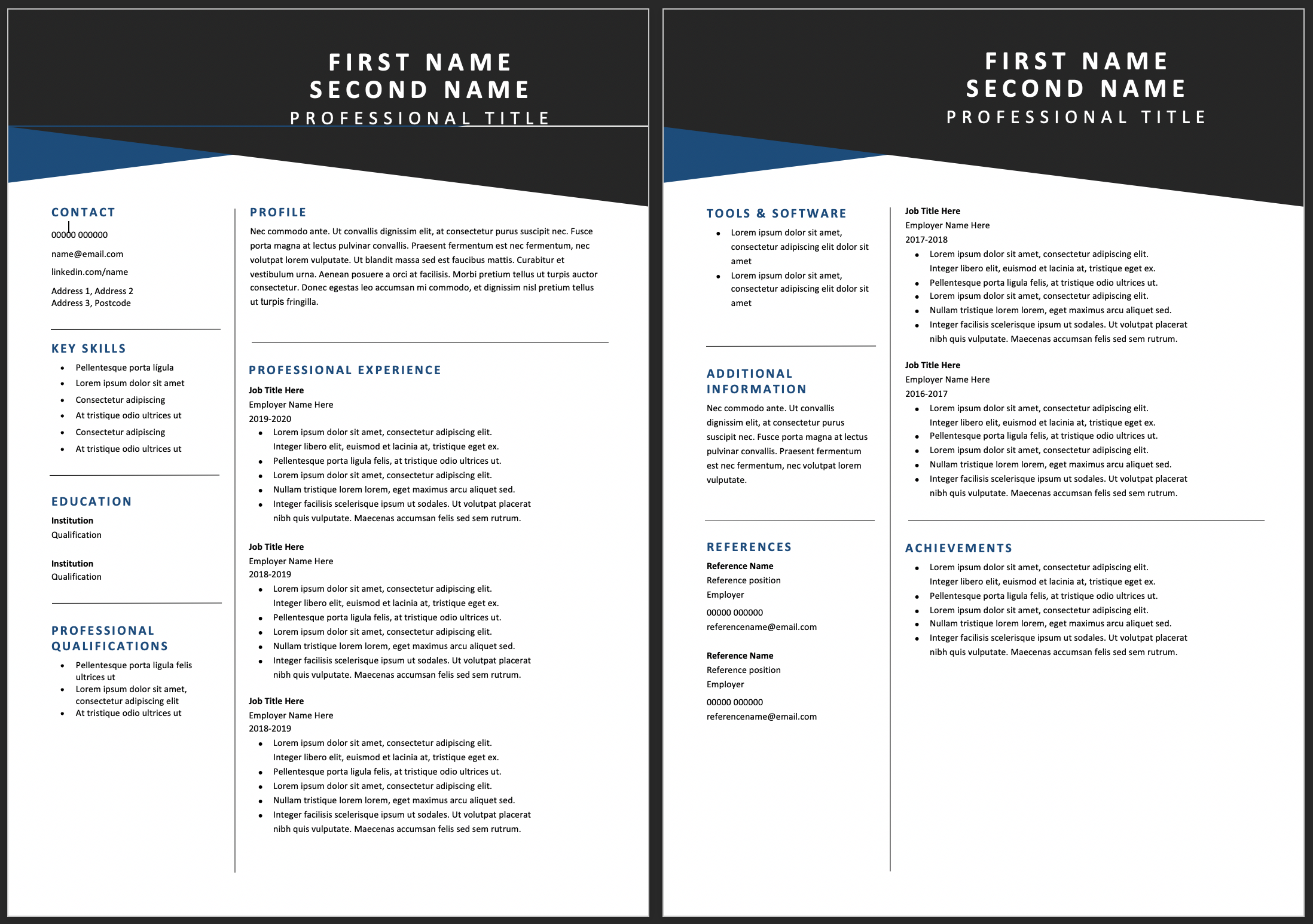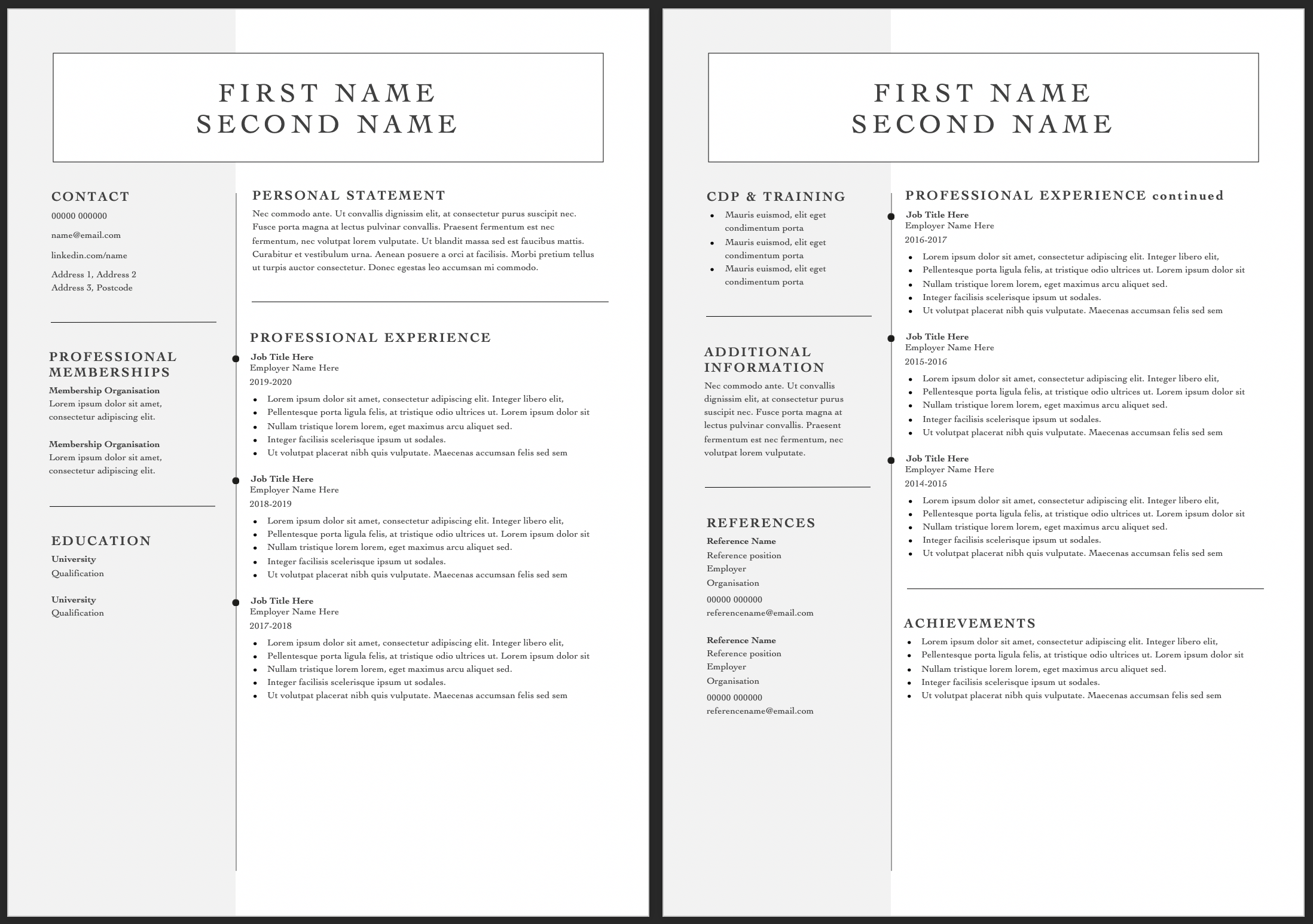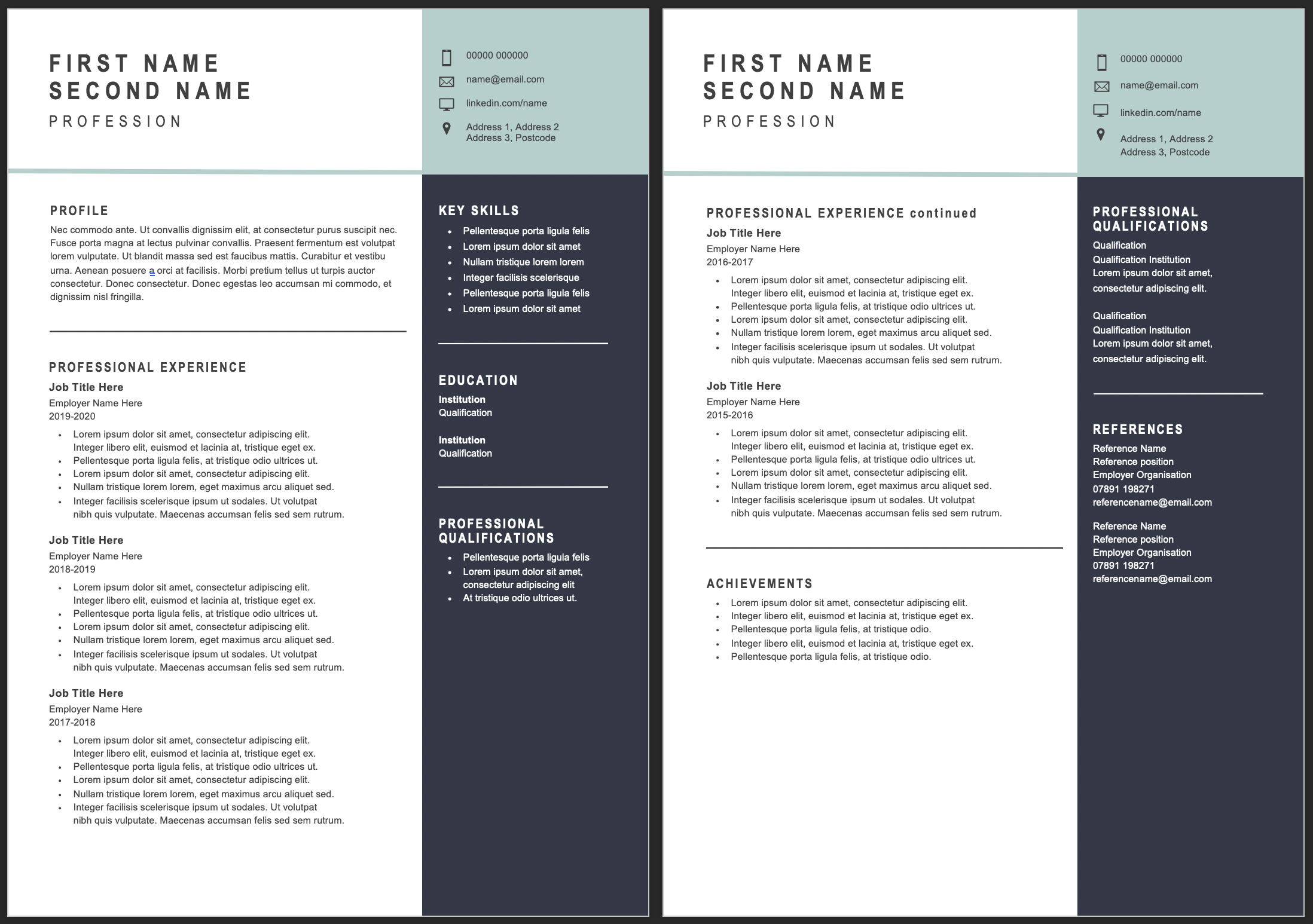[ad_1]
Download one of our free professional CV templates, learn what to include in your CV, and land that role you deserve.

To give you an edge with your applications, we’ve made some free CV templates that can help your name stand out. They’re professionally designed, visually striking, and best of all, free to download. We’ll also share guidance on what you should include in your CV and highlight online courses that will improve your application writing and interview skills.
Why use CV templates?
Knowing how to write a CV is a valuable skill in itself. It takes practice and a fair amount of trial and error. Although you know how much of a perfect fit you are for a particular role, it can be tough to explain that to a prospective employer – especially in just two pages of A4. Plus, when you’re entangled in job applications and a busy schedule, you might not have the time to create an eye-catching CV.
That’s where templates come in handy. Using a CV template saves time and ensures that you include all key information for the role you want. A good template serves as a sturdy foundation on which you can build a CV ripe to impress the right people.
Get a FREE CV review
Receive a personalised CV review from our trusted experts in just two days.
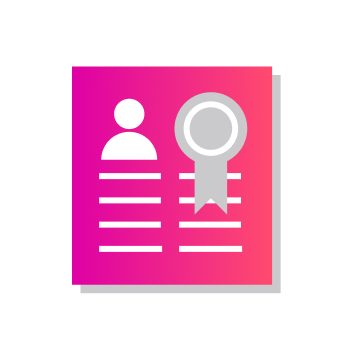
What to include in your CV
Let’s start by looking at a basic CV. Here are all of the essential details that should be included in every resume:
- Contact information: This section should hold your name, address, email, phone number, LinkedIn details, and other useful links (such as a portfolio). It’s the first thing a recruiter will see.
- Personal profile: In this short section, you should concisely summarise who you are, your career history, and your future goals. You should also outline what you want from your next role.
- Qualifications: All you need here is a brief overview of your qualifications to date. You don’t have to go into much detail, and your most recent and relevant education should take priority.
- Experience: The experience and employment history section is one of the most closely scrutinised by recruiters. As well as providing clear information about where you worked and when, you should describe in-depth your responsibilities and achievements in each role you’ve had. Whether you include difficult problems you’ve solved, impressive targets you’ve reached, or successful projects you’ve worked on, prioritise the accomplishments most relevant to the job you’re applying for.
- Achievements: If you want to showcase any of your achievements under a brighter spotlight, you can create a separate section to highlight these unique accomplishments and make yourself stand out. Just be sure to make it brief and to the point.
- Key skills: This is another area carefully examined by hiring managers as it showcases whether or not you’re qualified for the job you want. Assemble a list of your hard and soft skills with particular focus on those that relate to the role.
- Interests: This is an optional section. Here, you can present your hobbies and passions outside of work. If they link to your career, all the better. If your professional experience is limited, showing how you pursue a range of relevant interests can balance things out a little.
- References: If you choose to include reference details as part of your CV, you’ll want to select professional people who know you well.
Download the Basic CV template
CV templates for new graduates
Job hunting after you’ve graduated can seem like an exhausting process. Graduate roles are hot property at the moment, and competition for limited places is very high. You may think that you lack the experience to impress employers, but remember, recruiters don’t expect you to have tons of experience. Showcasing your passion and abilities are much more important at this stage. With this in mind, here are some ways you can spice up your CV to demonstrate why you’re the best person for the role:
- Skills: If you lack experience, a skills-based CV can be very valuable. Make sure you prioritise the skills outlined in the job description. To make up for your lack of experience, you should also give examples of when you’ve put these skills to use, perhaps at university or in a placement.
- Personal statement: This is another area you should look to enhance to offset any deficit in experience. Here, you’ll elaborate on what you can bring to the job and why you’re excited about the prospective role. You can also write about your motivations for wanting to join the company, your career objectives and what you seek to learn during your time there. Allow your enthusiasm to shine through this section. More than experience, passion and a willingness to learn are most important in landing a top graduate role.
- Placements and interests: We’ve all been haunted by the old paradox: jobs require experience, but you can only get experience with a job. If you do have some relevant experience, perhaps through a placement or internship, that’s fantastic! But if not, showing that you pursue a range of interests relevant to your chosen career can tip the scales in your favour.
Useful courses for graduates
- How to get a graduate job: This course focuses on how to navigate the graduate job market, helping you learn important things like employability skills, crafting cover letters, and optimising your LinkedIn profile.
- How to succeed at: interviews: This is a highly rated course created by the University of Sheffield. It will show you how to communicate your key strengths effectively to potential employers, how to tackle a range of different interview questions with confidence, and how to research organisations to identify the skills recruiters might be looking for in the interview. You’ll also develop an understanding of how to approach different types of interviews, from telephone to in-person exchanges, giving you the best chance to secure the job.
- How to succeed at: writing applications: Experts from The Careers Service at the University of Sheffield share their top tips to help you write exceptional job applications. You’ll learn how to produce the perfect CV and cover letter, and you’ll also hear from employers to find out what they really look for in a candidate.
Download the New Graduate CV template
CV templates for managers
When applying for a managerial role, it’s particularly important to show that you have a strong range of leadership qualities and experience. Adapt these sections of your CV to demonstrate that you’ve developed management skills in your industry:
- Achievements: As a prospective manager, make sure to present any achievements that reflect your leadership abilities. These could include managing people through trying circumstances, implementing positive change, or building relationships.
- Experience: Experience is key for any management role. When outlining your responsibilities, include details of your leadership duties to highlight your successful history in steering a team.
- Professional qualifications: Beyond your formal education, decorating your CV with courses you’ve completed in relevant skills – particularly leadership skills – can go a long way. It shows that you’ve actively sought to further your own professional development and have taken steps to improve your leadership skills.
Useful courses for managers
- Introduction to business management: King’s College London has crafted this popular course for those looking to get into leadership positions and establish key people, money and information management skills.
- People management skills: This course will help you learn the key principles of people management and develop your own management style.
- Influencing and communication skills for managers: If you want to become a better manager, this programme by the University of Law will teach you different types of professional interaction and help you foster improved workplace communication.
Check out our business and management courses to build career-ready business skills with top universities, and explore our management and leadership courses or online leadership degrees to enhance your leadership knowledge.
Download the Manager CV template
CV templates for marketers
Marketing is an industry where creativity, knowledge and results matter. As such, you’ll need to prove to your potential employers that you have a track record of displaying all three. Your marketing CV should be a piece of advertising in itself.
Will Bonaddio, former Head of Integrated Marketing at FutureLearn, speaks of what he looks for in a CV:
‘When talking about your previous roles, don’t just write a job description – make sure to talk about the impact you had. So, instead of saying “I managed the Twitter account for Brand X,” say “I increased the Twitter following of Brand X by 20% over 6 months.” The more you can show the real difference that you made in a role, the better.’
With this advice in mind, here are some areas of your CV to which you should lend a particularly thorough polish:
- Achievements: Marketing is all about results. Your capacity to convert creative campaigns into customers, clients and cash is crucial to carving a career in marketing. A section that shows your history of achieving targets and improving key performance indicators would furnish any CV with a golden shine.
- Experience: Demonstrating your marketing experience is essential, especially if it’s in a field related to your potential job. Highlighting any experience across a variety of industries would add an extra dimension to your CV, showing your versatility as a marketer. Of course, you could always fill this section with your list of significant achievements if it’s long enough.
- Tools and software: As marketing migrates further into the digital world, it’s critically important to show employers that you’re updated with the rapid development of technology. Make sure to outline the online tools and software in which you’re proficient, as well as any courses you’ve taken to sharpen your digital marketing skills.
Useful courses for marketers
- Marketing analytics: Another key area of modern marketing is analytics. On this course, you’ll learn how to use data to improve marketing results.
- Digital skills: digital marketing: This is a popular introduction to digital marketing. You’ll learn the fundamentals of online promotion and gain a strong understanding of search engine optimisation (SEO), display advertising, and pay-per-click (PPC) marketing. Perfect to grow your career as a marketer in the modern world.
- Digital marketing: coding, UX, and creating digital content: The University of Leeds has composed this comprehensive ExpertTrack course series to help boost your digital marketing career. Expect to learn how to create online-tailored content, UX for mobile apps and social media campaigns, as well as how to code.
Download the Marketer CV template
CV templates for teachers
As a teacher, your education and classroom experience are undoubtedly important. However, the more time you spend in the role and the more you develop your own unique teaching methods, the more other areas of your CV will need careful attention:
- Personal Statement: This section should sell your teaching qualities. As you amass more experience and develop your unique teaching methods, this is the perfect place to exhibit what you’re all about as a teacher and highlight why you’d be the right fit for the school of your choice.
- Professional memberships: Employers are always looking for that extra special ingredient in their prospective employees, and a membership to a professional teaching association could be what separates you from other candidates. It shows your dedication to the industry beyond the classroom and marks you as somebody who cares about improving both your own skillset and education on a larger scale.
- CPD and training: It’s especially important for teachers to show commitment to growing as a professional. So it goes without saying that it’s crucial to showcase the continuous professional development and training you’ve undergone to keep up to date with both your subject specialism and the latest approaches to teaching.
Useful courses for teachers
- How to succeed as a newly qualified teacher: Designed by education experts at Manchester Metropolitan University, this course will equip you with cutting-edge strategies to face the challenges of transitioning into life as a professional teacher. You’ll learn how to manage your workload, perform independent critical reviews of your own practice, and evolve your unique teaching style.
- Blended and online learning design: Learn to develop the best pedagogy for your students using online learning methods with experts from University College London (UCL). You’ll explore a range of digital technologies to help you design effective teaching activities while you expand your understanding of interactive and collaborative learning.
- Generative AI in Higher Education: Join King’s College London and build future-ready teaching skills. Understand the uses and limitations of generative AI to address its challenges and harness its potential for higher education.
Download the Teacher CV template
CV templates for data analysts and programmers
Programmers and data analysts are in high demand across a range of industries, and the job market for these professions is only growing year by year. However, competition is also growing, with more and more people developing future-proof tech skills. So, a top-notch CV is vital when it comes to landing the job you want. To get ahead of the competition, here are some areas you should take extra care in writing:
- Achievements/ projects: More important than work experience is the ability to demonstrate innovative usage of your technical skills, whether that’s in a previous job or in personal projects. Regarding personal projects in particular, showing that you’ve deployed your expertise impressively in activities outside of work shows strong dedication both to your craft and to self-improvement.
- Professional experience: Of course, a proven track record of professional experience in a related role will go a long way with securing you an interview.
- Key skills: Since roles in data and programming are technical positions, listing the software, online tools and programming languages with which you’re most familiar can provide quick reference points for employers. The more technical tools you can use, the more valuable you’ll be as a prospective employee.
Useful courses for data analysts and programmers
- Data analytics: From big data to the future of the information age, from marketing and business analytics to data analysis using Python – we have a vast collection of courses for people at any stage of their careers. Both advanced professionals and data analysts just beginning to learn their craft can boost their skills with our courses from world-class institutions.
- Coding & programming: These courses are designed and taught by experts in the field to boost your job prospects in programming and software development. You can learn AI design with Microsoft Azure, computer programming from scratch, coding for the web, JavaScript, machine learning using Python, app and UX development, and much more.
- Python programming: Completing this microcredential will earn you academic certification in one of the most in-demand programming languages in the world. Whether you’re just starting out or you’re already working as a digital technology professional, this course will help you develop a strong understanding of Python and advance your career as a programmer.
More IT and computer science courses
Download the Data Analyst and Programmer CV template
How to refine your CV
Once you’ve personalised one of these CV templates to showcase your skills and expertise, you should review your CV and ensure that you’re not missing any important elements. If you want expert advice and suggestions on to perfect your CV, you can get a professional CV review for free with FutureLearn.
Claim your free CV review now and take a step towards boosting your employability.
[ad_2]
Source link

